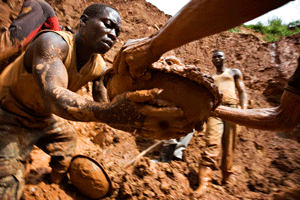Metals found in such everyday electronic items as mobile phones and computers, mined illegally in the eastern Democratic Republic of Congo, are helping to fund a conflict that has caused millions of deaths, says Global Witness, a nongovernmental organization that focuses on natural resources and international trade. “The main warring parties in eastern Congo...control much of the lucrative trade in minerals that produce tin, tantalum and Metals found in such everyday electronic items as mobile phones and computers, mined illegally in the eastern Democratic Republic of Congo, are helping to fund a conflict that has caused millions of deaths, says Global Witness, a nongovernmental organization that focuses on natural resources and international trade. “The main warring parties in eastern Congo...control much of the lucrative trade in minerals that produce tin, tantalum and tungsten, as well as gold,” according to a G.W. statement. “These groups regularly commit horrific abuses against the civilian population, including mass murder, rape, torture and forced recruitment.” The group challenged leading electronics companies to come clean about where they obtain their materials during the Feb. 15 opening day of the Mobile World Congress in Barcelona, Spain. “It is time for electronics companies to show they are serious about eliminating conflict minerals from their supply chains,” said a Global Witness campaigner, Daniel Balint-Kurti. Global Witness is urging the U.N. Security Council to use targeted sanctions against companies that support armed groups in eastern Congo by the illicit mineral trade.
Cellphone Justice
Show Comments (
)
Comments are automatically closed two weeks after an article's initial publication. See our comments policy for more.
The latest from america
Do the social networks that Catholic influencers are forming online reflect the values of the Gospel or those of the platform?
Whenever I teach a seminar on T. S. Eliot’s work, I spend the first day of class on ‘Marina.’
The figures represent a huge increase in abortion within a decade, since in 2012 abortion ended 20.84% of conceptions—a fifth of all pregnancies.
Serving life by caring for others is “the supreme law” that comes before all of society’s rules, Pope Leo XIV said in his first Angelus address at the papal summer residence.








